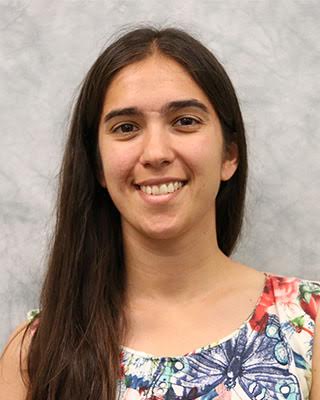
Oct 24, 2017 | Faculty + Staff

Biology
This fall, Ms. Olivia Tandon joined the Upper School Science Department to teach Biology I, Biology II, and AP Biology. Previously, Ms. Tandon taught at New York City public schools for two years, at a charter school in the South Bronx for one year, and at Poly Prep in Brooklyn for four years.
Ever since she was a child, Ms. Tandon has always been interested in nature. She grew up playing outside and collecting all kinds of insects, rocks, and other natural treasures. Gradually, she began to develop her love of the natural world. She understood that it is often not valued enough, resulting in numerous environmental issues threatening the insects, frogs, and plants that she had always loved to collect. Later, during graduate school, Ms. Tandon took classes in geology and paleontology through which she rediscovered her passion for these subjects.
For her undergraduate degree, Ms. Tandon attended Columbia University, where she double majored in Environmental Biology and Creative Writing.
Ms. Tandon then became interested in teaching. She started her teaching career in NYC public schools as part of the NYC Teaching Fellows and simultaneously received a Master of Earth Science Education from Brooklyn College. Last year, Ms. Tandon took some time off from teaching to pursue her second master’s degree in Private School Leadership at Teachers College, Columbia University.
Because Ms. Tandon’s father was a professor, teaching was an important part of her life growing up. Throughout her school years, she had met several incredible teachers who also inspired her to pursue a career in education. Also, she explained that her students at the public schools where she previously taught had instilled a love of teaching in her.
Initially, she planned on teaching at the NYC Teaching Fellows for around two years and then returning to graduate school to pursue an academic or nonprofit research career. In the end, however, Ms. Tandon “fell in love with teaching and wasn’t ready to quit after my commitment with the Teaching Fellows was up!”
When asked how she likes Pingry so far, Ms. Tandon referred to Pingry as an “incredibly welcoming place” and is happy that Pingry has already embraced the chicken coop. She is excited to work with fellow colleagues to build the Pingry farm over the next few years. She will also be coaching squash in the winter season.
Having recently moved from New York City, Ms. Tandon is excited to be able to hike and garden more, “both of which I can now do right in my own backyard and neighborhood, rather than having to travel miles away.” She also has two border collies, Archie and Finn. Archie, who has been trained in agility and flyball for many years, might come to the Pingry farm in the future and work as a herding dog!
Ms. Tandon is looking forward to a wonderful school year and continuing to get to know the Pingry community.
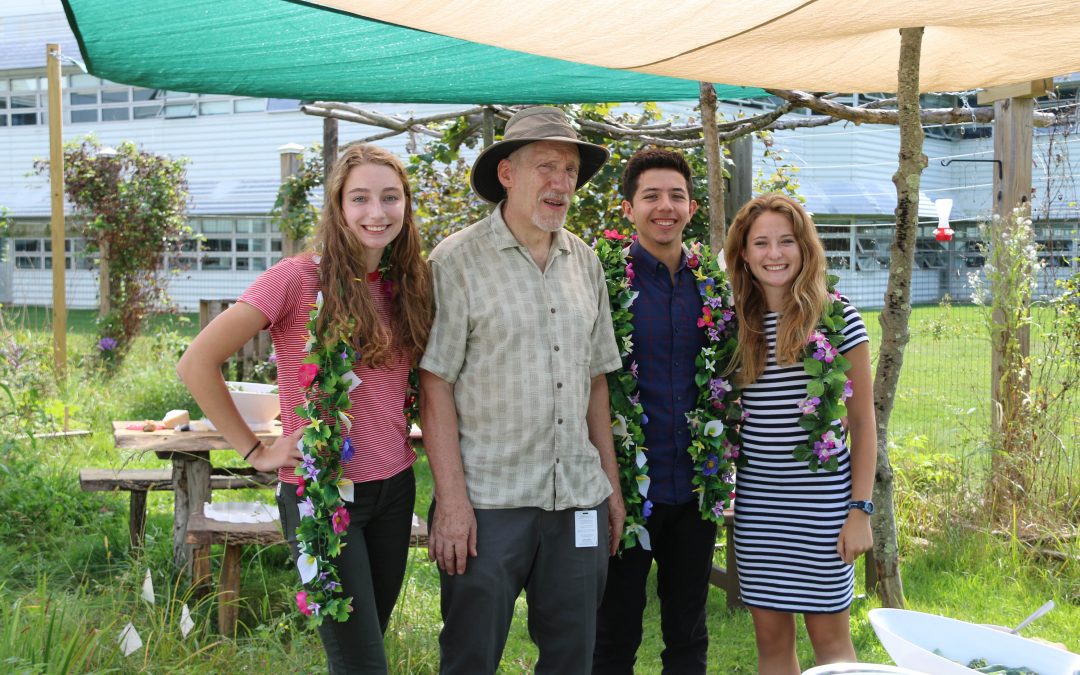
Oct 24, 2017 | Faculty + Staff
By Caroline Friend (V)
Mr. Peter Delman, former Drawing and Painting and Art Fundamentals teacher, is taking on the new role of Sustainability Coordinator at Pingry this year. As the Sustainability Coordinator, Mr. Delman has many projects planned to give Pingry a “greener” campus this upcoming year.
These “green” projects are inspired by Mr. Delman and the student-led Green Group, which he advises. “There is really a great group of student leaders this year,” Mr. Delman said. The returning leaders for the Green Group are Isabel DeVito (V) and Nick Ladino (VI), and the new leaders include Josie Cummings (VI), Caroline Petrow-Cohen (VI), Natalie Ladino (IV), and Isabella Acosta (IV).
One of Mr. Delman’s areas of focus is developing Pingry’s green campus design with Pingry graduate Scott Loikits, Principal/Design Director of Greenburg Farrow. Mr Loikits was a lead architect on the new Whitney Museum and the renovation of the Museum of Modern Art, and other major global projects. Loikits has been creating drawings and other plans for several upcoming projects, including a marsh walk and a tree canopy walk to be used in studying the wildlife around campus in science classes and for everyday access. In addition, there are plans to install an industrial- strength composter to process food from the cafeteria and possibly grass cuttings as well. The resulting compost will then be used as fertilizer for the soil on Pingry grounds.
One project that connects sustainability to academics is the outdoor classroom. According to Mr. Delman, timber-frame builder Greg Katz has proposed that “we upgrade significantly the outdoor classroom that we have now.” The outdoor classroom is currently located in the woods behind the cafeteria. Mr. Katz will “work with classes like Architecture and Art and Nature” on the project.
Mr. Delman is also working with Ms. Olivia Tandon, a new science teacher in the Upper School, to develop a farm program. Mr. Delman said, “Right now we really want to get students who will be part of our farm team.” The farm program currently includes seven chickens and a rooster, and future plans for the farm include planting fruit trees and bringing in pigs and goats.
There are also plans to install a deer fence around certain areas of the campus. Mr. Delman hopes that the deer fence will keep the deer out and allow other wildlife to to thrive. DeVito (V) added, “This will be used as a living laboratory for certain classes.” The deer fence is expected to be installed by October 15.
What is most important, Mr. Delman said, is that we “integrate all these programs into the curriculum.” He added that he hopes to “work with the Middle School and Lower School more, as well as with the wider community.”
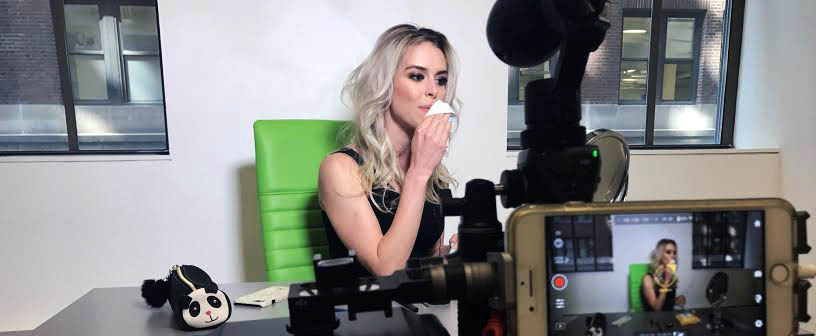
Oct 24, 2017 | Featured, Summer Experiences
By Miro Bergam (V)
Early last summer, I embarked on my first foray into the professional working world. Dressed in my business casual best and armed with a shiny new MetroCard, I hopped on the 7:30 A.M. train for the first day at my internship with a video journalism company down the street from the New York Stock Exchange.
After series of newbie mistakes—buying a ticket to Newark Penn Station instead of New York Penn Station, walking up Wall Street at least five times before finding my building, forgetting a photo ID, etc.—I arrived thirty minutes late to my office feeling even more daunted than before. I expected nothing less than a stuffy, time-crunching work environment run by an exacting boss, who would be annoyed by my tardiness on the first day.
Upon arrival, I was astonished to find that I was earlier than my boss. When he arrived, he apologized for his lateness, saying he was exhausted from a weekend of surfing. Before he showed me what I would be working on for the next month, he insisted on having coffee with me so we could learn more about each other. I’m not sure whether it was the relaxed manner of my boss and coworkers or the massive poster of an almost-naked Howard Stern on the wall near my desk, but I could tell that this job was not going to be the stereotypical, stringent, Wall Street experience I had expected.
That’s not to say my work wasn’t highly rigorous and educational. Over the course of my internship, I learned about the production of video journalism at all of its stages. I operated several different advanced cameras, used advanced editing software, and distributed videos to our third party buyers. Beyond these technical skills, I wrote and reported on reputable news stories. I also learned about finance through my multiple visits to the NASDAQ and New York Stock Exchange.
The casual and colorful environment under which I worked optimized my learning and made for a positive experience to which I would be eager to return. My boss made a point of this to me; he told me that he would rather his employees come to work happy than punch in a card on time, so long as all the work (around 15 videos per day) got done. He always emphasized the importance of loving one’s job, telling me how he had left his job on the Stock Exchange to pursue journalism. He said that although his previous job had been more lucrative, he had chosen to follow what made him happy. His choice to run his business in an easygoing, lively way reflects that same desire for all his employees to come to work with a smile on their face. The functionality of this work model really shone through when one of the reporters had a crisis at home. Thanks to the compassion of my boss and coworkers, the reporter took as much time off as she needed to handle the incident, as the rest of the employees gladly filled in for her. If the workplace were not run so leniently, I doubt anyone would have been as eager to help out, and the reporter would have had to compromise either her work or deal with the issue at home. However, since the company had been understanding in their times of need, the employees readily offered to fill in.
I came away believing that the style in which my boss leads his company should be applied to our lives at Pingry. On a personal level, this translates to how students allocate their time. I know how hard it is for Pingry students to quit anything; it took me several years to quit swimming, an activity I started out of obligation instead of interest. However, as my boss taught me in regard to his old job, doing something you dislike is neither productive nor sustainable, and pursuing what you are passionate about will optimize happiness and mental health.

Oct 24, 2017 | Featured, Summer Experiences
By Nicole Kloss (V)
Ever since I was a young child, I have visited my family in Germany every year. I used to love running around the quaint town of Schwabisch Hall, splashing my feet in the Kocher River, and playing mini golf tournaments with my cousins. Over my years of spending time in Germany, my love for the country and its culture has grown, which drove me to apply for a couple of internships in Germany this summer. However, the internship that stood out to me the most was one for BMW.
BMW, the Bayerische Motoren Werke, is a successful car company founded and located in Munich, Germany. The luxury car company is a large part of German culture and I was honored to have the opportunity to contribute to this amazing company. After being accepted to intern in the contracting department at BMW, my uncle and his family helped make the opportunity a reality by offering their home for me to stay in for one month.
Towards the end of June, I packed a suitcase full of business casual clothing, got on a plane with my family, and flew to Germany in anticipation for my internship. When we arrived at the airport, my mom and sister drove two hours west to Schwabisch Hall, and my dad and I drove two hours south to Munich. After arriving in Munich, my dad helped me settle in and I caught up with my extended family. However, it was not until the next morning, when my dad had already left for Schwabisch Hall, that I realized how independent I would have to become.
At home, my parents care a lot about my safety. They don’t want me to use public transportation alone, stay out late, or even walk around New York City by myself. But without my parents around, I had to adapt to my new independence. Along with becoming independent, I was determined to make the most out of my internship at BMW.
On my first day of work, my uncle explained to me how to get to BMW. Following his instructions, I walked from his house to the subway station, bought a subway ticket, boarded the U2 subway, and was finally on my way to BMW.
After the thirty-minute ride, I stepped out of the subway station. Directly in front of me was a large, sleek BMW building. I quickly realized that this building was where I would work, and I was stunned. I walked through the revolving doors and met Selin, a college intern whom I was to shadow. As I followed her towards our department, I was surprised by the amount of people I passed by. I later learned that tens of thousands of people work in that building alone.
When we got to our office, Selin showed me around the contracting department, gave me a desk, and explained what was expected of me. My duties included speaking only German and working from 8am to 4pm every day. Selin then gave me a tour of BMW through BMW’s employee bus service. The area BMW occupies is much larger than I had imagined, as the building I first saw occupies only a small area. I saw several large factory buildings and Selin even brought me to the nineteenth floor of the BMW headquarters. She then led me back to our office and gave me PowerPoint presentations to read about BMW and their history. I also learned a lot about the contracting department. After a long day, I took the subway back home. I was exhausted and went straight to bed.
Although my first day at BMW was overwhelming and required a lot of independence, my excitement to intern at a company I was passionate about continued during the time I was there. As an intern, I completed many tasks including translating contracts, filing contracts into excel sheets, and attending meetings with potential suppliers. I also experienced a factory tour.
My internship at BMW has helped me mature and I am grateful to have had a wonderful opportunity to learn more about German people, experience their culture, and be a part of the working environment at one of the most successful companies in the world.
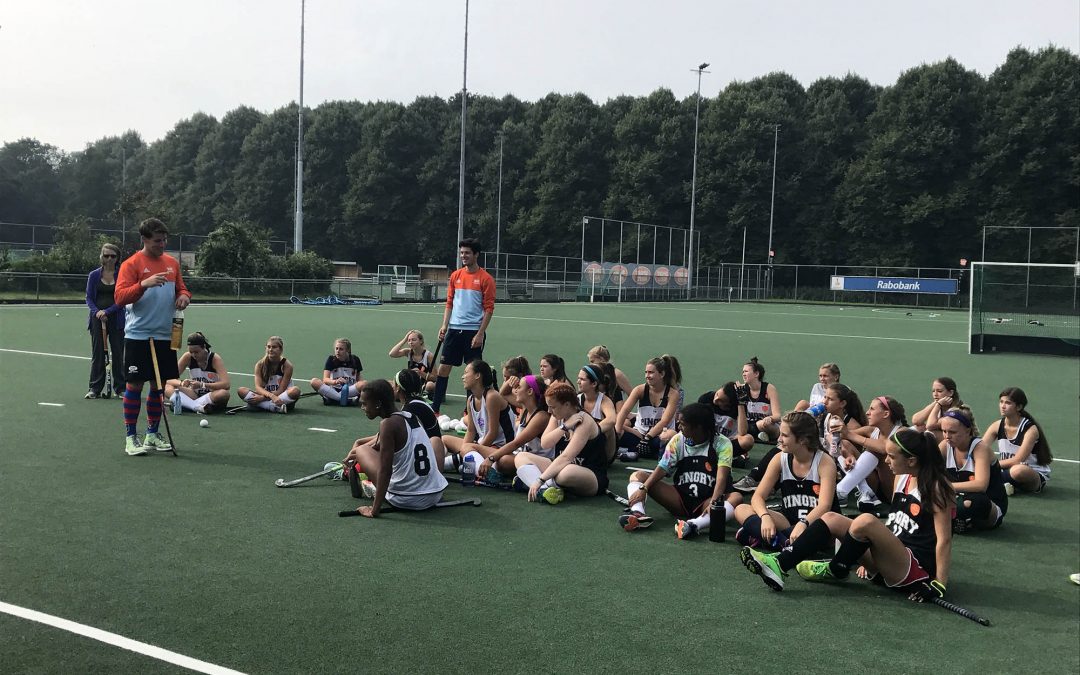
Oct 24, 2017 | Featured, Summer Experiences
By Shruti Sagar (VI)
More than two dozen field hockey sticks and giant harrow backpacks were piled on top of each other as we checked in at the Newark airport. I started to feel overwhelmed by the fact that this trip was actually happening. It was less than a year ago that my field hockey friends and I were joking around with our coaches about taking a team trip to Holland, so the fact that I was starting my senior year traveling to Europe with my best friends was still hard to believe. After weighing our bags, waiting in a long security line, and scrambling for last minute snacks, twenty-eight girls and four coaches boarded our evening flight to Amsterdam.
We arrived in Holland early in the morning and immediately boarded a bus to our home for the next nine days. Our team stayed in villas filled with common areas where we spent our time together every night. After dropping off our bags, we hit the ground running with a full day of sightseeing in the Dutch countryside. We were able to try Dutch pancakes, explore windmills and bakeries, and gain familiarity with the sights and sounds of Holland. We continued sightseeing the next day as we ventured into the capital city of Amsterdam. We spent our day touring Anne Frank’s house, shopping and exploring in smaller groups, and taking pictures in front of the beautiful buildings and elaborate canals.
After two full days of exploring Holland, it was time to finally play some field hockey. We each rented a bike and rode through the forest in the rain to the field hockey club where we would train. Field hockey clubs in the Netherlands are synonymous to country clubs in America; they have endless amenities and allow for athletes to socialize while practicing their skills using state-of-the-art facilities. We met our Dutch coaches, who became our friends and role models during our days of training. Their expertise and humor kept us entertained and working hard. We still reminisce about their jokes daily.
We fell into a routine while training that the team would come to love and miss once we came home. We hopped on our bikes each morning, sore from the previous day and bundled up in sweatshirts because of the windy, rainy weather.
We practiced with our Dutch and Pingry coaches for a few hours each day; then we took a break for lunch, which almost always consisted of sandwiches. The Dutch coaches introduced us to a couple of their favorite sandwich combinations, like peanut butter and chocolate sprinkles. After lunch, we would get back on our bikes to play a few more hours of field hockey. We also played in international matches with and against Dutch and international field hockey players. These athletes were incredibly skilled and agile, and it was amazing to see the differences in technique compared to American teams. One night, we were even able to watch the Dutch national team compete in a friendly match against India. Many of us had never seen field hockey at this caliber, and we were stunned watching their speed and flawless passing.
Throughout our trip, our coaches set phone restrictions for us that allowed us one hour of phone time each day; when we were touring and playing field hockey, our phones were to stay turned off in the villas. When we first heard about these phone restrictions, many of us felt uneasy about staying “unplugged” in a foreign land, but after nine days full of dance parties, solving a thousand-piece puzzle, deep talks, and endless rounds of elephant master and card games, many of my teammates reflected on the no phone policy as a positive experience. Because of our efforts to live in the moment, we were able to immerse ourselves in new perspectives and cultures, creating an unforgettable experience that will remain a part of Pingry field hockey for years to come.
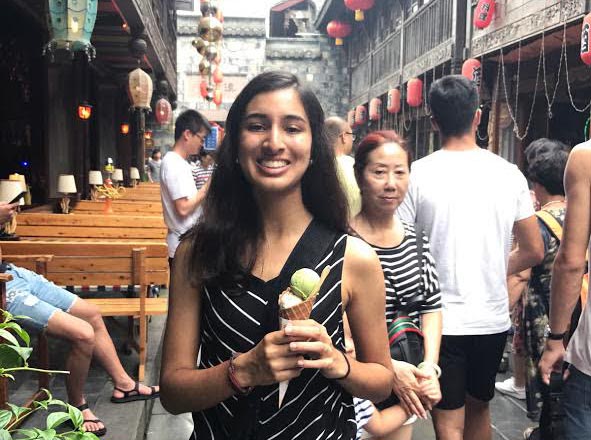
Oct 24, 2017 | Featured, Summer Experiences
By Alisa Chokshi (V)
This past summer, I was fortunate to receive a National Security Language Initiative for Youth (NSLI-Y) scholarship from the US State Department for a language and cultural immersion program in China. NSLI-Y’s goal is to help prepare American citizens to be leaders in a global world by helping students gain critical language skills and cultural knowledge to promote communication between countries. The Chinese language has always fascinated me with its complex characters and tones. As an aspiring polyglot, I thought this would be the perfect opportunity to learn it.
I became part of a group with 27 other teenagers who turned into family over the course of six weeks.
The program offered the unique chance to communicate with Chinese people from all walks of life, such as the ones I met and befriended on domestic flights, my host family, teachers, peer tutors, the elderly, young children, shopkeepers, and waiters.
From climbing the Great Wall to swooning over cute pandas, from having a traditional farm lunch in the countryside to crashing Chinese weddings, I was truly immersed in the local Chinese culture, an experience unlike anything I could have imagined.
My excitement made my host family appreciate their culture even more. Wednesday was my favorite day of the week because we had morning language classes and then spent the rest of the day on a cultural excursion to usually do community service. I volunteered at a kids’ summer camp, helped out at senior citizen centers, and taught young children English.
On one particular Wednesday we went to Huang Long Xi, a famous ancient town that has a river flowing through it. There were hundreds of Chinese people playing around in the water, and my friend and I tried to stay away to avoid getting soaked. Unfortunately, this was not so easy. As my friend was taking a picture of me, a man came up behind us and soaked us with a bucket of water. We were annoyed, but at the same time, we realized we were getting the authentic experience.
Among my favorite times were the weekends when my host family and I would go on long road trips to a different cities, exploring their history and culture. Overall, I went to six different cities over the course of six weeks. In the end, I was in tears at the Chengdu airport. Saying goodbye to my host mother and sister was so difficult.
I have a lot to think about now that I’m back in America.
During the first week in Chengdu, I remember hearing a thought-provoking statement during our visit to the US Consulate. A representative had told us that the relations between two countries are built on people-to-people interactions more so than exchanges between media, government, etc., and I remember thinking that this concept was so simple yet so powerful.
After finishing my program, I can now say with certainty that the people-to-people interactions I had with Chinese people were the most rewarding part of my experience. Whether it was joking around with my Chinese friends, having meaningful discussions with my host family, or simply bargaining with shopkeepers in Chinese, I broke down many stereotypes and gained a true appreciation for China and its deep culture.
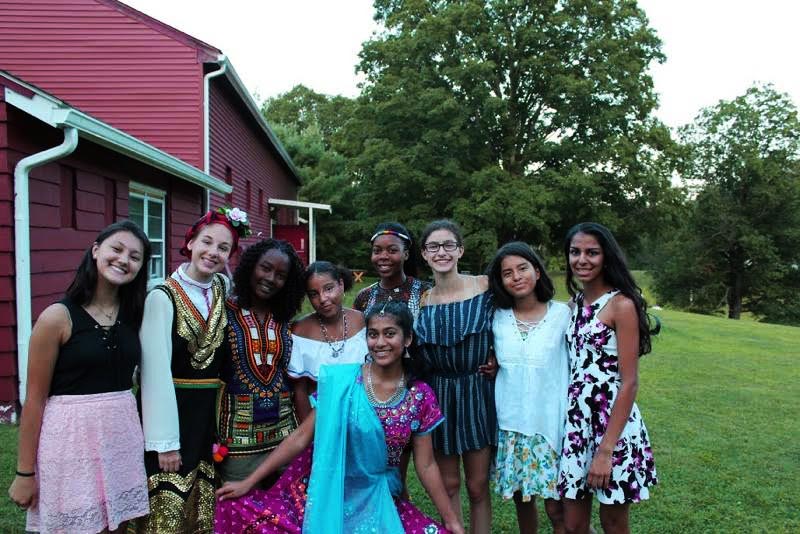
Oct 24, 2017 | Featured, Summer Experiences
By Anjali Kapoor ’20
It was 2 AM and I was alone in the woods. Under the stars and next to a fire, I stayed up all night writing a letter to my 21-year-old self. It was vigil night—a camp tradition since 1930. Camp Rising Sun is a full scholarship international leadership camp that I attended this summer in Rhinebeck New York.
Growing up I always heard the term “diversity,” but this camp was diverse on a whole new level. I got to meet girls from over 30 countries in North and South America, Europe, Africa, Asia, and the Middle East. In fact, a couple of my best friends at camp were from Israel, Korea, and Spain! We received instructions about academics, art, or culture every day, led by campers or counselors. One of my favorite instructions was by a Spanish camper who taught us a Spanish dance, el candil. In another instruction, a counselor who is an acrobat at a circus taught us how to do tricks on the silks. I learned cultural dances, listened to new music in different languages, and tried food from all over the world. One girl described camp as a way to “travel around the world without going anywhere.”
Another fun part of camp was being sachem. Sachem is a Native American term for chief or leader, and the sachem gets to run camp. I was chosen as sachem of our wilderness trip, a three-day hiking and camping trip at another campsite. At the campsite, we cooked by fire and sang our favorite songs every night as we made s’mores. When another camper was sachem, she organized a fashion show. It was so fun dressing up, taking pictures, and strutting down our runway. Another night, the sachem organized a murder mystery night. We teamed up and ran around the buildings with flashlights looking for clues about the murderer among us.
We also had council on Thursdays, another camp tradition. It would start by us meeting after dinner in silence, singing “Rise up Old Flames,” and walking into the woods in a single file line holding candles. We would sit around a huge fire and pass around the council rock. When you received the rock, you had the opportunity to talk in front of the whole camp. Counselors would share life advice and campers would share personal stories or sing songs. Finally, we would end every council with our arms around each other singing “Lean On Me.” This really reinforced the bond between everyone at camp.
This camp is everything a traditional summer camp is and more! We still did the usual fun summer activities, such as canoeing in our camp lake and sleeping in cots underneath large tents of tarp every night. However, I also got to meet girls from all over the world. This camp was such a life-changing experience, I wanted to share it with everyone. I learned so much and have made friendships that will last a lifetime!
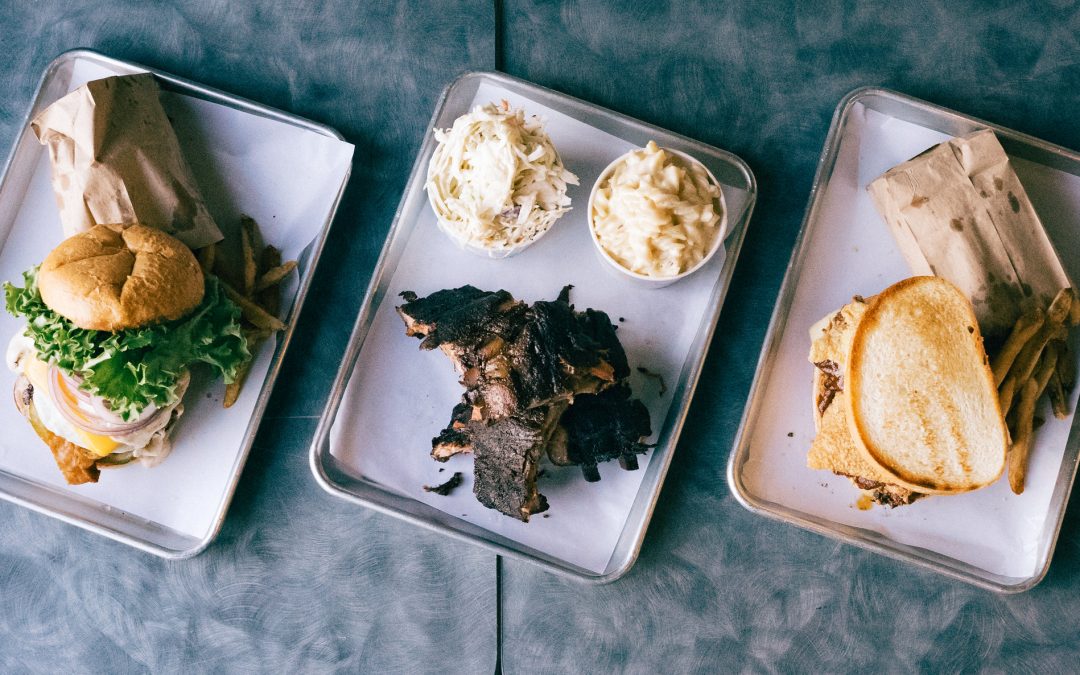
Oct 24, 2017 | Columns, Food
By Alyssa Chen (VI)
Delicious sandwiches and burgers, massive portions, and quirky décor can all be found at Burger/Que of Basking Ridge, a relatively new casual BBQ and burger spot located on King George Road, only ten minutes away from school.
I had passed by Burger/Que many times on outings to Frozen Falls or O’Bagel: in the context of the plaza, the restaurant’s corner location seems to make it an afterthought. A few months after first noticing it, I suggested the spot to a few friends who were in the mood for burgers. It turned out that the little store had a lot more flavor than I had expected, both in terms of atmosphere and food.
The first notable item was the décor. Even before entering the restaurant itself, we passed by a large metal pig sculpture. Inside were paintings of cows and pigs, cute signs, and a hand-chalked menu board, among other little trinkets. The restaurant itself was not large, seating at most around 30 patrons at tables for mostly three to four people. The atmosphere was both laid-back and full of character, from the alternating blue and brick walls to the metal buckets on each table used for holding sauce bottles.
The food was flavorful and filling. We ordered cheese fries as a table; I ordered the brisket sandwich for myself. The cheese fries were topped with two types of cheese and served in a large portion—addicting to the three of us who were there.
The brisket sandwich I ordered turned out to be two of the thickest slices of toasted bread I have seen sandwiching a good amount of fatty beef brisket, onion straws, and provolone cheese. Just half the sandwich was more than enough for one sitting. The meat and onion straws seemed to overflow from the bread—not a negative, considering the excellent flavor and texture of both. The bread itself was probably one inch thick and toasted to a crisp.
My friends, who ordered the BYO (build your own) Burger and the Figaliscious chicken sandwich, seemed to enjoy their meals, too. Looking around the restaurant, I noticed other quirky and tasty-looking sandwiches, such as the waffle burger (a patty surrounded by two waffles).
As Naiyah Atulomah (VI) said, “Their food is so amazing, I don’t care how I look when I eat. By the end, I have food and a content look on my face.”
The only two complaints I might have for Burger/Que are that the portions are too large and the food is unhealthy. Of course, the latter is what one expects from such a burger joint, and the former “complaint” is really just a great deal, considering that most sandwiches cost $10-11 and that the restaurant provides carry-out boxes for those (like me) who cannot finish an entire sandwich.
If you are looking for a break from the usual dry or monotonous meal, or if you enjoy satisfyingly flavorful sandwiches, I would highly recommend giving Burger/Que a visit. A great meal awaits.

Oct 24, 2017 | Columns, Music
By Allie Verdesca (VI)
Transitioning from summer to fall is tough. Having to balance a new schedule while also getting back into the swing of schoolwork makes it easy to get overloaded with new information. However, one of the benefits of this season of change is the amount of new music being released. Hundreds of artists are releasing new songs for the fall, and with the help of fresh new sounds and outlooks, you’ll be better prepared to take on the new school year.
Looking for an edgier approach by a superstar? Try Taylor Swift’s new album, Reputation. Although the album won’t be officially released until November 10th, her lead single “Look What You Made Me Do” is already taking the world by storm. In mid-September, it was ranked number 3 on iTunes’s Top Songs and number 1 on Billboard’s Hot 100. Her other song from the album,“…Ready for It?”, also rose to number 4 on Billboard’s Hot 100. “Look What You Made Me Do” marks a significant shift in Swift’s musical style. Her last album, “1989,” was her first full-fledged venture into the world of pop music. This time around, Swift’s lyrics contain newfound themes of revenge and shady nods to those who have wronged her in the past. The rhythm of the song and its infectious beat provide the perfect backdrop for her spiteful lyrics and determined message. There’s no doubt that Reputation will become wildly successful upon its release.
Still popular is one of this summer’s most notable releases, Kesha’s album Rainbow. Following a controversial contract dispute and a sexual assault case, Kesha’s songs “Praying” and “Rainbow” show the singer’s renewed passion and positivity in the face of setbacks. A central theme of the album is affirmative energy, and this is not only reflected in the album’s vibrant and psychedelic music videos and album cover, but also in the very fibers of the songs’ rhythms. “Praying” is a pleading, satisfying pop tune with a good message of forgiveness and renewal.
On the more alternative side of the spectrum, Imagine Dragons’s new release “Believer” has a catchy and gritty beat that has commanded attention this fall. Their album Evolve, which was released last June, contains the band’s typical futuristic and post-apocalyptical sound, represented in its shouted vocals. The other main single off the album, “Thunder,” introduces a new, more synchronous style to the group’s usual intense chords and choral background vocals. It has a more generic pop sound, which isn’t my personal taste, but for those looking for more variety in Imagine Dragons’s usual sound, this song may be for you.
In this same vein of more rock-sounding, alternative beats, Fall Out Boy has been teasing their fans with songs off their album Mania, set to be released in January of 2018. The three leaked singles so far, “The Last of the Real Ones,” “Champion,” and “Young and Menace,” have already become immensely popular. “Young and Menace” has been a real experiment for the band. Ever since their last album American Beauty/American Psycho, Fall Out Boy has been experimenting with integrating a classic pop sound into their more traditional rock, angst-ridden, pop-punk sound. “Young and Menace” is one of Fall Out Boy’s first official forays into synth and auto-tuned sound effects, a recent trend in many popular songs. “Young and Menace” has a great build up; the song starts off soft, with a driving beat, until it finally coalesces into mass hysteria at the chorus. “Champion” is a much more subdued song, with a simpler instrumental accompaniment. It is more like their typical style; gritty, determined vocals are paired with a strong drumming beat to craft a great pump-up song that will be sure to get you through those first trying weeks of school. No matter how you’ve managed to deal with all the layers of stress that come with the beginning of the school year, I hope that all of these new releases will keep you motivated for a great year to come!

Oct 24, 2017 | Columns, Media
By Alexis Elliot ’18
Shots fire out at a local gas station. The culprit? Up-and-coming rapper Paper Boi. Atlanta opens up with a scene that epitomizes the message of the show: minor mistakes cause major damage. Coming off the heels of an Emmy award, Atlanta is a show that paints the hardships of life that so many people face in a profound way.
Writer and producer Donald Glover stars as Earn, a Princeton dropout who can barely make ends meet. Earn has to find a way to support his daughter and now his cousin, Paper Boi. Desperate to make an income, Earn turns to music management after seeing the success of Paper Boi’s new song.
However, before Earn can make an attempt at making a career out of Paper Boi, he first has to await bail for the gas station incident. Earn and Paper Boi sit in jail, and while the scene is depicted simply, Donald Glover inserts several critical messages. First, one of the inmates is clearly mentally ill and repeatedly provokes the guards. They know he is ill, but the guards just laugh at him. The guards wait until this inmate pushes their annoyance to the edge to finally rough him up. Earn is in shock and pleads for the man, asserting that the latter is mentally ill and doesn’t know how to control his actions. In addition to mental illness, other issues such as transphobia and homophobia are explored in Earn’s time in jail, all in a single scene.
After their time in jail, Earn and Paper Boi return to their project of turning Paper Boi into a household name. The rap life proves to be difficult as Paper Boi has to dodge critics, make ends meet, and clean up his name after the gas station incident. Earn and Paper Boi are accompanied by their sidekick Darius, who often holds them back from success. The trio symbolize the misfortune of opportunity without resources.
Paper Boi has the talent to be a street rapper, but he has to learn the reality that the street life widely differs from real life. He needs to learn to make connections with important reporters, promote himself at clubs, and manage his money properly.
As a rapper himself, Donald Glover tries to portray the message that the rap life isn’t easy and not everybody makes it. In Atlanta, Donald Glover shows the constant setbacks that characters face including homelessness, racism, and a lack of resources. Yet what makes the show outstanding is the fact that Glover manages to convey these subjects in a comedic manner.
One example is the scene when Earn decides to impress his girlfriend Vanessa by taking her to a fancy restaurant. Earn only has $90 in his bank account to spend on their night out. Viewers see how Earn tries to avoid paying for parking, orders only one glass of wine, and orders the cheapest meal on the menu. However, Vanessa insists on getting a valet, she orders a bottle of wine, and the pushy waitress makes them try every expensive item that the restaurant serves. In this scene, along with many others, viewers find comic relief from how relatable Earn’s struggle is.
At other times, I found myself laughing until I realized the veracity of the underlying message. In a satirical episode, Paper Boi is starring on a show called Montague, and during one of the breaks, a cartoon commercial for a cereal similar to Froot Loops appears in which the kids steal the cereal from a mummy. As I was laughing at the stupidity of the commercial, a police officer appears and pins the mummy to the ground. I began to realize how Atlanta uses its creative genius to touch on a subject as deep as police brutality in a fake commercial. I literally had to rewatch the scene to better understand the message.
This is what makes Atlanta different. Viewers laugh at the comedy of the struggles that the characters face but are also challenged to pick up on the various messages that it leaves behind. Although the storyline simply follows an up-and-coming rapper and his manager, Atlanta causes the viewer to question all aspects of society. I highly recommend this show, and its short, hilarious episodes make it an easy watch. Season 2 doesn’t come out until 2018, so there is still a long time to catch up on this fantastic masterpiece.

Oct 24, 2017 | Columns, Fashion
By Kristine Fu ’19
Although the summer season of sundresses and denim shorts has sadly ended, fall is the perfect season to mix and match your summer wardrobe with cozy sweaters and cardigans. With temperatures rising and falling from 50 to 75 degrees in a single week, it may seem difficult to dress appropriately. However, it’s always a good idea to dress in layers during seasons like this, especially since some areas of the school are freezing cold while others are extremely warm. Cardigans and vests are definitely good investments for this season because of their versatility, simplicity, and comfort. Plaid shirts, which can be worn by men and women, will forever remain the staple item of fall fashion. New trends and looks in the hall for girls include: wide hoop earrings, flared sleeves, and Steve Madden flats. New trends and looks in the hall for boys include: rolled up khakis and basketball jerseys on dress down days. Both genders, however, forgo on the “no white after Labor Day” rule, opting for classic white sneakers. Frequently seen in the halls are Sperry topsiders, which are designed to be boating shoes. The rubber sole and comfortable lining makes it a sensible choice for girls and boys. As the weather starts to get colder, leather boots are a good way to keep warm while evoking elegance and style.
Although private schools like ours are stereotypically depicted to be preppy and pastel, don’t be afraid to break away from the trends and express yourself! The beautiful fall colors are perfect for inspiration. Rajeev Doraswamy (V) gives some tips on men’s fashion: “I like wearing vibrant fall colors like a bright maroon and even matching the color themes of my collared shirt with my pants.” Kat Deliargyis (V) also agrees that color is a highlight of this season commenting, “My favorite part of fall fashion is the colors, especially in eye makeup and statement earrings. It’s all about the really funky stuff.” There is no better time to experiment with gold eyeshadow, peach blush, or a Bordeaux lipstick than this season. Kat also brings up a good point about statement jewelry. Any ensemble can be dramatically changed when paired with a layered necklace or a set of tassel earrings. One of my favorite things to do is to go to flea markets in Chelsea in New York City to find unique pieces of jewelry.
There have also been exciting new changes to the school dress code, which now allow for shorter dresses and skirts (at 4 inches above the knee) and tailored T-shirts. On the other hand, the dress code for dress down days will be more strictly enforced, officially banning sweatpants and pajama wear. While some may argue that limitations restrict creativity and self-expression, as Mr. Shilts said in my sophomore year English class, “under limits, one becomes even more creative.”
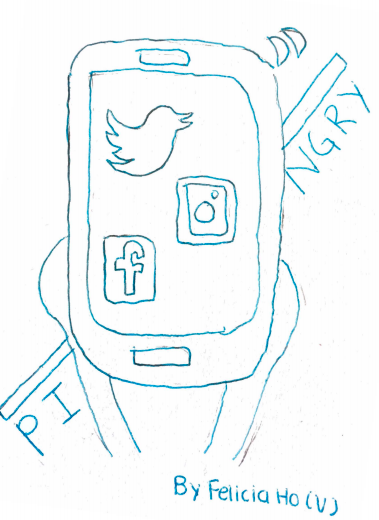
Oct 24, 2017 | Opinion
By Anna Wood ’18
Simply put, media is powerful. A single hashtag or posted message can influence people for months. We’ve seen trends such as store robberies and dangerous stunts. We absorb the posts we see online, oftentimes more than we think we do. As members of society, we should keep this in mind. Rachel Chen (VI) agrees. “On one hand, I understand that we are students and we do represent Pingry,” she said. “We’re supposed to be the best and the brightest–representing honor and integrity and citizenship.”
On the other hand, we are allowed to exercise our rights, including freedom of speech. While we are fortunate to have this liberty, consequences are inevitable. Ultimately, it is the individual’s decision to gauge whether or not their message will influence others in a positive manner.
Pingry, however, is a private day school — and one of the strongest in the country, at that. Resources, time, and energy shouldn’t always be spent dwelling on events that aren’t directly affiliated with the school. Actions displayed at athletic competitions, arts performances, and on campus activities reflect the values of the Pingry community; informal events between students do not mirror Pingry to as full of an extent. Private details of students’ personal lives should not be mixed with their academic endeavors, as long as those details don’t reflect their behavior on campus. Provided that Pingry students are honorable, dedicated, and respectful in their daily lives on campus, it is not up to the school to decide what students do in the privacy of their own homes.
The Honor Code states, “The members of the Pingry community should conduct themselves in a trustworthy manner that will further the best interests of the school, their class, and any teams or clubs to which they belong.” Pingry students who dutifully serve their athletic teams, clubs, and classes certainly follow this aspect of the Honor Code. Certain human values can be encouraged, but cannot be wholeheartedly enforced outside of the community.
Unfortunately, social media is melting the privacy that keeps home and school separate. Social media is the easiest form of communication, but it can be misinterpreted. A post not intended to harm others can most certainly do so if we aren’t careful. Content shared on social media can compromise safety and reputation, even when privately shared.
Some may argue that nearly every platform of social media allows the user to go “private,” disabling strangers from viewing his or her posts. Others may add that online expression changes relative to the platform of social media. Among the younger community especially, Facebook, Twitter, and Reddit report the most use in retrieving news, whereas Instagram, Snapchat, and Youtube are used in a more casual manner (“News Across Social Media Platforms 2017”).
That being said, media users must still be cautious on their Snapchat accounts or their private Instagram profiles. Posts are not only viewed but also shared and discussed. In other words, private isn’t truly private. A post that sparks political controversy, no matter how concealed, will still emerge from the shadows and be spread to every corner imaginable.
Liberty lets us flourish in our own opinions and ways of life. But limitations are still present. We
must utilize the privilege of freedom with maturity values are destroyed over
social media, they are destroyed in the real world.
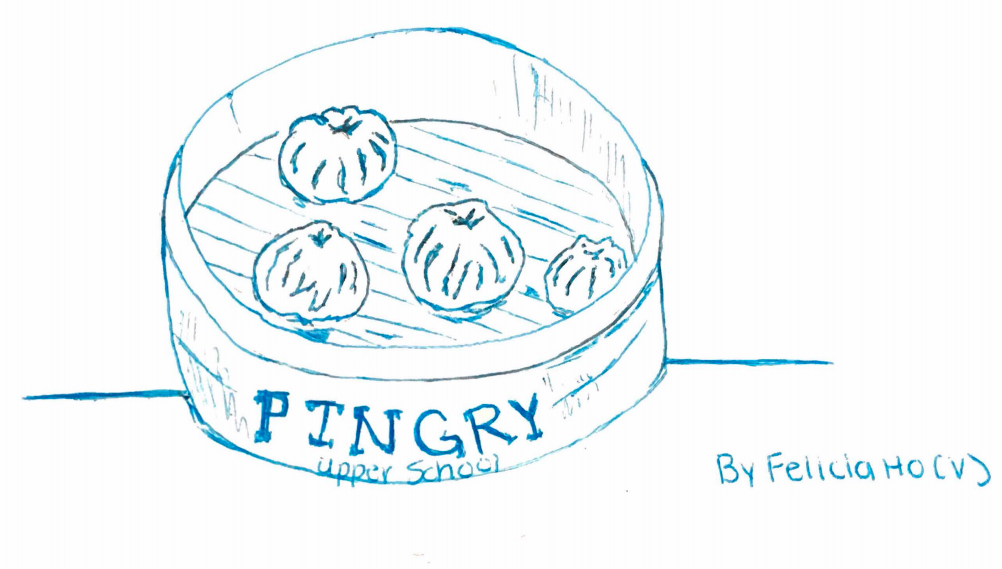
Oct 24, 2017 | Opinion
By Felicia Ho (V)
Transitioning into high school is a lot like walking into a dim sum restaurant. Sometimes you hear great ‘reviews’ of high school, sometimes you only hear about the huge amount of pressure during high school. However, you never know until you truly experience it yourself.
In a dim sum restaurant, like the one I go to with my family, you are greeted by an eager old woman who whips out a red stamp maker and a pen and begins to list what she brings to the table from an overflowing cart.
“Over here we have some chew beef tripe, fresh from the kitchen,” she says. “And here are some soup dumplings and noodle rolls, and some shu mai! Finally over here we’ve got some filling tofu soup.”
Her auctioning descriptions finished, she impatiently clicks her pen and waits for your answer. So what would you like? she wants to know, already ready to move on to the next table.
Ninth grade can feel exactly like that.
At first, it seems overwhelming: suddenly, teachers aren’t holding your hand anymore, and your friends seem to be so competitive. Just like the servers at a dim sum restaurant, more and more people seem to be impatient. Each teacher expects you to treat his or her class as your focus, and thus they pile work onto you, yet you still have to make time for hanging out with friends.
Although it may be hard at first, my suggestion is that you try to look beyond the pressure in high school. In other words, think beyond what the servers at the Pingry high school dim sum restaurant may think of you.
Think about what’s on the cart, instead.
Beckoning to you are tons of clubs, striving to get your attention and attract more members. Some are science-related, such as Anatomy Club or Journal Club, while others are more humanities-focused, such as Toastmasters or the Pingry Record. On other plates sit other clubs related to Community Service or environmental issues, and still more clubs revolve around the idea of exploring different hobbies and interests, such as debate or astronomy.
With so much to choose from, how do you decide?
It’s freshmen year, so just go for it!
Just like in a dim sum restaurant, what may sound gross at first, like the steamed beef tripe (cow stomach), might actually turn out to be great (steamed beef tripe is one of my personal favorites)! Once you’ve got a great selection in freshmen year, you can start developing which clubs are your favorites – which ‘dishes’ do you always come back to every day you walk through the doors of the school? Throughout your four years in high school, you’ll become the expert on these dishes, and you will grow to be a frequent customer of this dim sum restaurant. You will become an expert on the culinary delights of high school.
Don’t worry. You won’t be alone! Although some teachers, just like some servers in the dim sum restaurant, will set seemingly impossible deadlines, others will become your support base throughout your high school career. Your friends and family are also a part of this group, and when you’re not sure what order to make, don’t be afraid to ask for their opinion; they’ll be glad to help.
Oct 24, 2017 | Opinion
By Megan Pan
One morning last week, I was driving myself to school when I got into an accident.
It wasn’t anything terrible. I was a little careless on the turn into the school driveway, and my car ended up scraping against the curbside stones. Aside from a harsh clang and the physical jolt of the ricochet, it wasn’t too serious, and once I parked and headed inside I thought nothing more of it.
Flash forward to 5:30 that afternoon: tired from classes and play practice and dreading the work that awaited me that evening, I was more than ready to enjoy the drive home, listening to music while coasting thoughtlessly down the highway. However, as soon as I accelerated onto I-78 eastbound, I noticed that there was a loud, rhythmic thumping noise coming from the back of my car. Panicking, I made the first exit I could and trudged along until reaching the nearest gas station.
As it turned out, I had actually blown a tire from my accident that morning. Somehow, I had failed to notice it after parking and even upon returning to my car in the afternoon. Luckily, a trucker filling up at the gas station was kind enough to lend a hand. He replaced the flat tire with the spare in the trunk, walking me through the procedure so I would know what to do in the future.
“Thank you so much,” I said to him after he was done. “If it hadn’t been for you, I probably would’ve kept driving on the blown tire.”
“You wouldn’t have wanted to do that,” he replied. “You could end up really causing damage to the axle or the hub or something if you keep driving on a flat tire.”
Having been told not to drive over 50 miles per hour on a donut, I scouted a new route home that wouldn’t take me along any freeways. On local roads, it would take about 40 minutes in order to get home. Seeing as I had little other choice, I sighed and buckled myself in for the long ride.
As it turned out, I actually quite enjoyed this little detour. Following this route, the landscapes were much prettier and more varied than the industrial gray and the conventional green of the roads and signs along the highway. Ambling along winding roads and steep hills, humming along to my favorite songs while admiring the view of the setting sun, I was able to experience a rare 40 minutes of tranquility in the car all by myself. I didn’t think about the work that I needed to do or the upcoming deadlines for all my assignments or even the editorial I had been procrastinating for the newspaper. I just drove and drove and made my way back home.
You might be wondering why I’m telling you this, all of which seems to add up to simply an anecdote of a minor inconvenience in an otherwise ordinary day. But by the time I pulled into the garage that evening, I had realized something important.
Since the beginning of the school year, I have been working myself to the point of exhaustion in the attempt to do everything. Juggling a full course load, college applications, extra-curriculars, and family obligations, I have skipped meals, shed tears, and sacrificed sleep to try to get everything done. In terms of my physical and mental well-being, I had definitely blown a tire. In spite of that, I was still struggling to keep going on a flat tire, resulting only in ineffectiveness and further disappointment.
Within the Pingry community, there is a sense of urgency pervading the atmosphere that makes many people feel as if they’re running a race in which they can’t afford to stop or slow down. There is a constant deluge of things to do, and with the added pressure of seeing everyone else around you working hard, you push yourself past your limit to be able to keep up.
But you can’t keep driving on a flat tire. It’s simply not practical, and you run the risk of causing further damage to yourself, whether you sputter out from excessive fatigue or explode in a burst of stress and frustration. What students must come to understand is that when they find that they’ve reached a point at which trying to keep going would only prove counterproductive, it’s necessary and perfectly fine to take a moment to breathe. When times get rough, take the time to perform repairs, fill up on gas, and pick up a couple of snacks from the convenience store. Then, you’ll be ready to hit the road again.
People often use the metaphor that life is a marathon in the sense that it’s a long-distance race and you have to pace yourself. However, I’d like to provide a modification of that metaphor. To me, life is not a quest to complete a set distance along a set course while competing to achieve the fastest time; in fact, it’s not a race at all.
To me, life is a long car drive. All of us are driving at different speeds and in different directions, and we’re each going someplace different. But no matter where we’re headed in the long run, it’s important to take the time every once in a while to exit the highway, slow down, and truly enjoy the scenery.
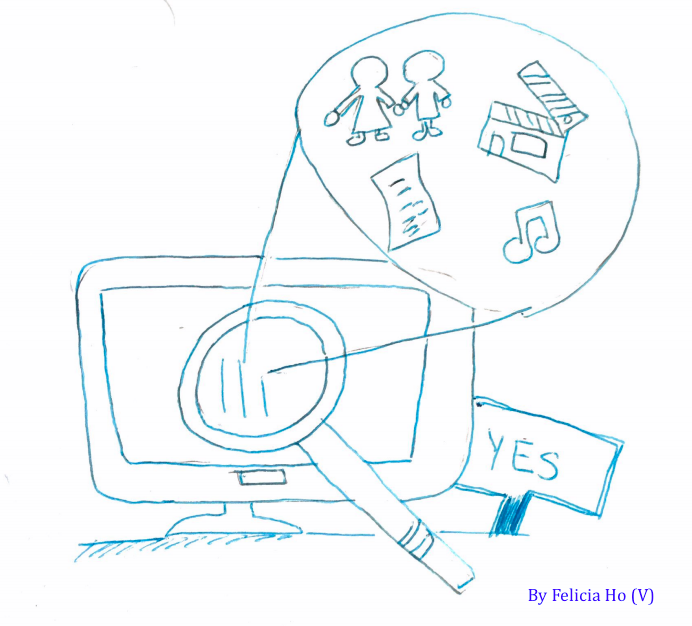
Oct 24, 2017 | Opinion
By Ketaki Tavan (V)
We’re told as children that sitting in front of the TV is a waste of time. It hampers creativity, creates couch potatoes, fosters laziness, and leads to a meaningless existence. We’re told that our time would be better spent reading a book instead.
Reading books is an exercise for our brains that teaches us how to analyze and interpret what comes our way, feeds us valuable life lessons that we can implement at our liberty, and makes us thoughtful contributors to society armed newfound knowledge regarding the human experience. But why do we see watching movies and TV as incapable of doing the same?
In recent years especially, I’ve become more acutely aware of the value of English class. The chances that I will encounter the precise themes of Pride and Prejudice or Holden Caulfield’s “coming of age” in The Catcher in the Rye at some point during my future career are likely slim, but the act of reading these books, I’ve realized, doesn’t hold its value in the way we might initially assume.
In English class, we’re taught how to read, or rather, how to consume media. And I’d argue that this exercise in the thoughtful consumption of media can be beneficial when applied to quality movies and TV as well.
We spend years training our minds to read a certain way: to engage in critical analysis, to become more attuned to detail, and to look beneath the surfaces of these works to draw connections to the larger world in which we live. To my surprise, I began to notice myself watching movies and TV through a similar lens.
At face value, movies and TV provide entertainment, and I’ll be the first to admit that some media is good for nothing more. However, there is a host of digital material out there that is thoughtfully crafted and can prompt its audience to engage with the cultural moment in which we live and the facets of our contemporary world.
Take Black Mirror, for example, a controversial and thought-provoking series that explores the uneasiness of our modern world. Each episode considers a different injustice, tapping into the psychological damage of war, the disturbances of our technology-obsessed society, and the troubling themes we have come to label as entertainment.
Watching Black Mirror prompted me to consider our world in its current state in a way that, as I read more and at higher levels, great literature does as well. Despite its satirical and amplified portrayal of our current problems, Black Mirror acts as a stimulus that prompts viewers to unearth the glimmers of these issues that can be seen in our modern world. In a subtle way, the show shapes its audience into active, engaged contributors to our society.
Showtime’s Shameless, a TV series about a dysfunctional family struggling to make ends meet in South Side Chicago, is another show that has stimulated my mind in a way similar to that of literature.
Shameless is my favorite TV show for a host of reasons, the biggest reason being that it’s what first allowed me to recognize the value of quality television. The show’s directors artfully underscore the nuances and depth of the human experience, and the fact that their vehicle to convey this narrative is digital allows for the engagement of the audience’s senses in a way that is unique from that of literature.
Watching Shameless becomes more than following an admittedly entertaining plot; it begs you as the viewer to give credit to its subtleties. Prior to my watching Shameless, never before had a TV show commanded me to pay attention to its soundtrack, staging, camera angles, and script. It effortlessly conveys the rawness of human relationships and the very real and relevant stories shared by many American people today. This detail and these messages are familiar—they’re the heart of the academic literature we’re told to read and taught how to read.
Movies and TV shows aren’t a replacement for the enrichment that reading provides, but they can sharpen our intellect in similar ways that reading can.
I encourage people to discard the belief that TV and movies are a mindless way to squander time, to recognize the genuine and powerful properties of digital media, and to consume them in an intentional manner that, in many ways, parallels the treasure that is reading literature.















